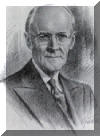|
 Paul
Harris began by saying that he was glad to be once again among the people
who spoke his own tongue for though he spoke perfect French and classical
German, the people of those countries did not seem to understand him.
"Rotary" he said, "is going through a critical period of its existence." A
contemporary newspaper report in the Hull News described his speech thus:-
"In the first years they were all very self-satisfied and self-centred. They
had publicity committees and told the world what splendid fellows they were.
They were now being subjected to criticism by such writers as H L Mencken
and Sinclair Lewis in America, and Bernard Shaw on this side of the water.
Columbus discovered America and Newton gravitation. Distinguished writers
were now discovering Rotary. They (Rotarians) had been wondering how they
ought to face this critical attitude. Some members thought they ought to
oppose it, but there was a danger that if they did so, they might get the
worse of the encounter. Some thought they should ignore criticism, but some
of them thought they ought to analyse Rotary and consider whether the
movement for which they had given so much was really worthwhile. Paul
Harris began by saying that he was glad to be once again among the people
who spoke his own tongue for though he spoke perfect French and classical
German, the people of those countries did not seem to understand him.
"Rotary" he said, "is going through a critical period of its existence." A
contemporary newspaper report in the Hull News described his speech thus:-
"In the first years they were all very self-satisfied and self-centred. They
had publicity committees and told the world what splendid fellows they were.
They were now being subjected to criticism by such writers as H L Mencken
and Sinclair Lewis in America, and Bernard Shaw on this side of the water.
Columbus discovered America and Newton gravitation. Distinguished writers
were now discovering Rotary. They (Rotarians) had been wondering how they
ought to face this critical attitude. Some members thought they ought to
oppose it, but there was a danger that if they did so, they might get the
worse of the encounter. Some thought they should ignore criticism, but some
of them thought they ought to analyse Rotary and consider whether the
movement for which they had given so much was really worthwhile.
A charge that might be laid at their door was that of being
too expensive. The cost of maintaining their organisation without counting
the imponderable factors had been estimated at $50 million a year. If the
figure was anything like as big as this they must give heed to the matter.
What was there to justify their existence? The Golden Rule came to his mind.
It was a doctrine that had found its expression in religion long before
Christ, but they were trying to put it into practice in the business affairs
of today. People were inclined to talk about it and not to act upon it.
Referring to what he called Rotary's objective activities,
Harris said that they were offering educational facilities to something like
125,000 young men. They ran numerous boys' organisations, boys' clubs and
institutions and had many other sporadic activities, including 125
playgrounds. If there was nothing in Rotary outside its work among boys, it
might be justified. It was, however, doing an enormous work for crippled
children for whom there were institutions in 31 American States. The time
would come in the United States when there would be no crippled children
except those beyond all medical aid.
|
The dissemination among business organisations of codes of
'vocational ethics' was another great work. If every man could be induced to
think of his business as his opportunity for contributing to the progress of
mankind, the world would be a better place. There was no logical and ethical
limit to this side of Rotary work but to reach all men. They also
endeavoured to propagate international goodwill, and the force of these
influences should not be minimised. He liked to think of Rotary as a
tremendous educational organisation for the purpose of making men better
members of society- a university with seats in 44 different nations and
which would eventually have seats in every nation of the civilised world. It
seemed to him that under the miracle of friendship there was such a thing as
men being 'new born'.
He did not want to attempt to influence the religious life
or conceptions of any of his hearers, but he felt that perhaps his
experience of Rotary had been the finest thing in his life. They could not
make any religion right by criticising it or hating it or fighting it, and
he felt that the more they tried to change it, the more solid it would be in
the things they believed to be wrong. Hatred never accomplished anything;
they could only rely on brotherly love. There ought to be a sanctuary
somewhere on the face of the earth where men could get together in the bond
of friendship and direct their endeavours towards the good of mankind. It
was his hope that the Rotary movement might provide that place."
NOTE This speech, made in similar vein elsewhere on his tour
in 1928, was very well received by a large gathering of local Rotarians
organised by the Hull Rotary Club, and was described by the newspapers as
"witty as well as earnest" . After the vote of thanks by Allan Daley, the
city's Medical Officer of Health, Paul Harris was presented with a silver
cigarette box on which the arms of the city of Kingston upon Hull were
engraved. This item is not in the Paul Harris room at One Rotary Center in
Evanston and its whereabouts too is unknown.
Basil Lewis
Also see Harris' own journal of the 1928 tour |

